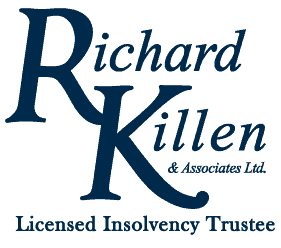How to Restructure Your Finances in a Covid-19 Crisis
Posted on: April 29, 2020Posted in Advice from Richard, Finances, Financial Advice | Comments Off on How to Restructure Your Finances in a Covid-19 Crisis

The COVID-19 crisis continues and with the lockdown extended many businesses will continue to be closed and people will be out of work longer. While many Canadians are fortunate to still be working, the threat of suddenly getting laid off from work looms for many as the future is still uncertain. Understandably, everyone is worried about their finances. No one can escape, one way or another we all feel the economic impact of COVID-19.
Our government and those in positions of authority are doing what they can to help. We need to be proactive and help ourselves as well. One of the things we can do right now as we are facing unprecedented times is to review our budget and see where we can cut back expenses — let’s not wait when we have already lost our job or if our next paycheque is reduced.
Here are some suggestions on what you should do to restructure your finances in this difficult time:
Set your current budget differently
If you don’t have emergency savings right now, it might be a little late to save up. What you can do now is restructure your current budget into an emergency budget. We do not know the long term financial impact this pandemic will create, so we need to set up a new budget based on our current financial circumstances while anticipating any future financial turn of events. You may need to consider a reduced level of income and possible changes in monthly expenses.

Sit down with all family members and have an open discussion on ways to reduce expenses in the household so you can have the money saved and used for important essential expenses.
Some areas to look into:
- Cancel monthly expenses for gym memberships, newspaper and magazine subscriptions
- Put expenses for transit passes and parking permits on hold if possible
- If you have two cars and are not using both at this time you can find out how you can reduce extra vehicle insurance — it’s possible to save several dollars a month by temporarily cancelling the insurance or choosing to remove or reduce liability and collision.
- Remove special channels from your cable package to reduce the total amount you have to pay each month if you can’t cancel completely.
- Reduce spending on buying in-app items, downloading games, music or pay-per-view movies, or other non-essential shopping online.
Many of your expenses will be less or different than before the COVID-19 crisis hit — fuel costs will be minimal as you may now be working from home, daycare expenses can be omitted for now because of school closures, expenses for entertainment and recreation like eating out and watching movies can be eliminated for now because of the lockdown.
Use a budgeting spreadsheet or budget workbook and start outlining all of your expenses. Just skip over the income section if you don’t have any now or aren’t sure how much you’ll actually have, and start listing the most important expenses first — rent, food, and medicines are your primary basic needs now, but also account for immediate utilities like power, water, gas, and communication needs like internet and phone bills.
If you don’t have enough money to cover all utility expenses, contact each service provider to see how you can reduce what you need to pay by at least 10 per cent. Many utility and communication providers are offering extended and flexible payment arrangements. See if you can scale back your service plans temporarily to save a little on each bill. Be careful of fees and interest charges that may be hidden in the revised terms. Any flexibility with your payments that you can find right now, take it so you can stretch your money for as far long as you possibly can and, if possible, you can start putting some of it away in case things get worse.
Halt RRSP and TFSA contributions

In any situation that money is tight and you’re forced to choose between paying bills and saving, always pay your bills first. While it’s important to save for the short term as well as the long term, it can be difficult to set aside money for your RRSP and TFSA savings right now with your income gone or drastically reduced. Experts say that the best thing you can do right now is to leave your RRSP and TFSA savings alone. Continue putting money into them if you are able to, if you cannot just leave them as is.
You may find the need to tap into your RRSP and TFSA savings to tide you over during this rough financial patch, but experts say the best thing to do is leave them untouched. In many ways, it can be difficult to access savings that are in a TFSA with many banks closing its doors to customers now, and you will also most likely face penalties for withdrawing money from an RRSP before retirement.
If your current income permits you to save a little bit every month, the best thing to do under these unpredictable circumstances is to stash it away in a high-interest savings account even if the interest earnings go down. All that matters right now in these uncertain times is to have money set aside that you are able to quickly and easily withdraw in case of an emergency.
Reduce loan repayments

Loan repayments will be an important part of your emergency budget, and if you’re still able to make full repayments on your loans, then you should continue to do so. However, if you’re in survival mode and your situation is at a point where you need to choose between putting food on the table and paying down your debt, then your priority should be to meet your immediate need for food. Make the minimum payments on your loans if you can, and make alternate arrangements with your lenders as soon as possible to keep debt repayments on track.
Many of Canada’s banks and lending institutions have all announced that they will review requests for assistance on a case-by-case basis. This assistance may come in the form of mortgage payment deferrals, loan extensions, revised terms or even reduced interest rates. What your lenders will be able to offer you will largely depend on several factors:
- what you need help with,
- your payment history,
- how soon you contact them, and
- your most recent credit behaviour.
A critical step here is to contact your lenders as quickly as you can, before you even miss a payment. If you think there is a possibility of losing your job in the near future, or if your income has been reduced and you realize you can no longer afford to make the payments, talk to your creditors immediately and they will be in a better position to help you.
Also keep in mind that any revised arrangement on a loan means new terms and conditions, so make sure you understand any revisions made. Another thing to remember — deferring a loan payment only means skipping the payment for now and paying it at a later time, it does not mean that the debt is eliminated. You will still have to pay, and if you’ve not made any arrangements with your creditors these payments will add up all at once once the extension period is over. And don’t forget that if you get to skip a payment it doesn’t mean your interest charges were skipped, too. The interest accumulated even with the payment skipped.
Seek advice to ease the uncertainty. Keeping a roof over your head and food on the table is the most important thing right now, even if it means reducing debt payments and savings.
However, If you’re facing looming debt problems due to COVID-19 and are worried about how it will play out, the best thing to do is to seek help from a Licensed Insolvency Trustee (LIT) like Richard Killen & Associates Ltd. We will review and assess your current financial situation and give the best advice on how to deal with your finances in this COVID-19 emergency.
We can also get involved on your behalf. We can help you restructure your entire relationship with your creditors. Sound advice from a LIT can be critical in helping you find the best option and empower you to make the best decision for you and your family at this time of crisis.
We at Richard Killen and Associates remain committed to help you in this global health emergency. If you need to talk with us, contact us anytime at 1-888-545-5365, or email us at lawrence@killen.ca or brampton@killen.ca and we do the free consultation on the phone or by email or video conference online. You don’t have to spend the next numerous weeks worrying about the future.










